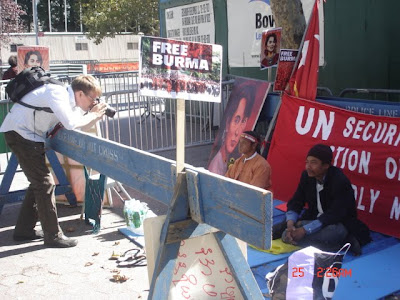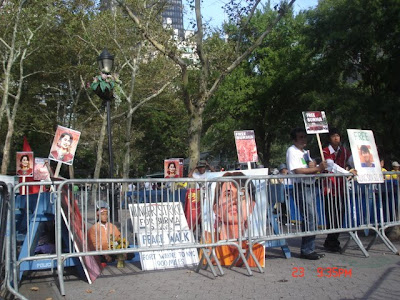
Causecast’s Jonathan Harris recently had an opportunity to speak with Maung Maung Tate about his dedicated activism and the pursuit of freedom for Burma and imprisoned democratic leader Aung San Suu Kyi. Tate’s answers were translated into English by Moe Chan.
JH: So, where to begin. What day did the hunger strike end?
MMT: It just ended last Sunday.
JH: How long was it going on, and how was the decision made that that would be the course of action to take?
MMT: It began on September 18 and went until the 27, and before that we sat in for nine days as a sit-in protest, and before the sit-in we took a little more than 3 months for the 900 mile march. We started from Fort Wayne, Indiana.
JH: Once you arrived at the United Nations building, what happened there? Did anyone recognize you? Did anyone ask you questions? What was your experience there?
MMT: We distributed pamphlets and of course there were international diplomats passing by, and many of the international diplomats passing by agreed with us, and some came back with their own media people and documented our actions. And some of the people passing by stopped and signed the petition.
JH: What did the petition say, and what is your ultimate goal?
MMT: The first goal is for the United Nations Security Council to resolve the Burma problem immediately. Secondly, we are asking that the United Nations General Assembly remove the illegal representatives, the regime, from the United Nations, and replace the seats with legitimate representatives of the people of Burma. Furthermore, we demand that the legitimate representatives be the winners of the 1990 general elections. Moreover, when we request the international community to replace the military representatives with the 1990 election winners, the United Nations must show by example. It should start at the United Nations.
JH: Do you feel you are closer to achieving those goals? Do you feel you are closer to a resolution with the United Nations, or that they will act on either of these tenets?
MMT: Yes, right now some of our representatives are already speaking to the international diplomats regarding the matter and they have a meeting with many of the officials at the United Nations. I think the process has already begun and should move forward. I would like to add that for us, the spokesperson is myself.
JH: So what do you think concerned Americans and other concerned citizens of the world should do if they feel like you and want these same two goals to be met – that the issue in Burma be resolved and that legitimate representatives are put in place?
MMT: I believe that the United States has been consistently supporting our cause and there is no doubt about it. In 2004, ten days into our actions at the United Nations, the United States representative to the United Nations, named Stuart Holliday, came to us and told us that they would help with our cause and discuss our Burma issues at the United Nations. The U.S. has been consistent in pushing our agenda at the United Nations forward and subsequently the U.N. council ended up discussing Burma’s issues. In 2006 and 2007, they continued to discuss Burma and finally it came to some decision making about Burma’s issues. For the Americans, I would like to suggest and request that you speak to the United States government to help implement the requests that we have been making throughout the years, which are to resolve Burma’s issues through United Nations mechanisms such as the Security Council. There is also a group called Friends of Burma founded by Secretary-General Ban Ki-moon and certainly, of course, for the American people to work with the U.N. members to no longer legitimize the military junta’s representatives at the United Nations.
JH: Now that after the trial Aung San Suu Kyi was given another 18 months of house arrest, do you believe the military government will release her when the new sentence is over? Or what do you think they will do?
MMT: The reason they placed Aung San Suu Kyi under house arrest for 18 more months is only because, as we predicted, they don’t want her to compete in the 2010 elections. From what I understand, they will continue to detain her until the 2010 elections are over.
JH: What do you think the chances are of a resolution? Do you think it’s possible to put enough pressure on them to allow Aung San Suu Kyi to participate in those elections?
MMT: As of now, we don’t have any 2010 elections because they haven’t reached international standards of the way they will be holding their 2010 elections. If they want their elections to be legitimate and recognized by the international community, they must respond to the requests that the National League for Democracy Party has made, which is first of all to release all political prisoners, including Aung San Suu Kyi, and they need to evaluate, and perhaps make corrections to the constitution they have drawn up in 2008. The international community must have a system to help monitor the election process to make it free and fair and make sure that all those political parties and leaders are able to participate. Until then, we don’t believe the 2010 elections are suitable to anyone.
JH: Okay, I want to get back to the hunger strike and the process of that. Is it something that you have done before and was it extremely arduous? How do you feel it helped affect your resolve and the mission while you were in New York at the United Nations?
MMT: Even before we actually began our actions, we have stressed that what we will do, especially with the walking of 900 miles, the sit-in, and the nine day hunger strike, we have done what we set out to do, and in the meantime we have sent out letters to the United Nations Secretary and to other nations, especially nations that are concerned about Burma issues. We have requested the previous demands that I have mentioned to you, and we will continue to the follow up with some of our representatives with these matters.
JH: So what’s the next thing you plan to do? There is obviously much more to be done, so now that the walk and the hunger strike are over, what are you going to do now to continue to get the word out and encourage the United Nations to take these actions?
MMT: As of now, we are planning to continue with further actions, such as collecting petitions, and doing similar actions in other parts of the world with the support of colleagues. Of course, our spokesperson will continue to follow up as he has been working on these issues.
JH: Is there anything else you would like to add to tell people who will be reading this interview?
MMT: One thing I would like to add is that currently, although the Burmese regime has extended Aung San Suu Kyi’s house arrest, they arrested her before the 18 month extension. The last time they began their arrest was at the end of May 2003, when they tried to assassinate her in a very small village and after they failed to assassinate her, they put her in prison then continued with the house arrest. When looking at all these facts, any international government can determine it’s obvious that the military junta has done many, many illegal activities. It is obvious that this regime has done these brutal acts against our people. The world must do more to take action against the regime. The fact that our leader has not been released and they continue to detain her is an illegal act that the military junta has done, and the world should not stand and watch the military regime to continue with its brutal act.


 အစာအငတ္ခံဆႏၵျပပြဲ ေနာက္ဆံုးေန႔ကို ရဲေဘာ္မ်ား အားက်ိဳးမန္တက္ တိုက္ပြဲ၀င္ေနၾကစဥ္
အစာအငတ္ခံဆႏၵျပပြဲ ေနာက္ဆံုးေန႔ကို ရဲေဘာ္မ်ား အားက်ိဳးမန္တက္ တိုက္ပြဲ၀င္ေနၾကစဥ္



 ထိုေန႔မွာပင္ KHALISTAN ႏိုင္ငံမွာ ႏိုင္ငံသားမ်ားကလည္း သူတို႔လြတ္လပ္ေရးအတြက္ လာေရာက္ေတာင္းဆိုတိုက္ပြဲ၀င္ေနၾကစဥ္
ထိုေန႔မွာပင္ KHALISTAN ႏိုင္ငံမွာ ႏိုင္ငံသားမ်ားကလည္း သူတို႔လြတ္လပ္ေရးအတြက္ လာေရာက္ေတာင္းဆိုတိုက္ပြဲ၀င္ေနၾကစဥ္ Washington DC ရွိ VOA သတင္းဌာနမွ ဗြီဒီယိုမွတ္တမ္းအဖြဲ႔ကလည္း သတင္းမွတ္တမ္းလာေရာက္ယူေနစဥ္
Washington DC ရွိ VOA သတင္းဌာနမွ ဗြီဒီယိုမွတ္တမ္းအဖြဲ႔ကလည္း သတင္းမွတ္တမ္းလာေရာက္ယူေနစဥ္



























 သတင္းေထာက္မ်ား သတင္းရယူေနစဥ္
သတင္းေထာက္မ်ား သတင္းရယူေနစဥ္

 အစာအငတ္ခံ ဆႏၵျပျခင္း ၆ ရက္ေျမာက္ေန႔ အမွတ္တရ ဓါတ္ပံုမ်ား
အစာအငတ္ခံ ဆႏၵျပျခင္း ၆ ရက္ေျမာက္ေန႔ အမွတ္တရ ဓါတ္ပံုမ်ား








